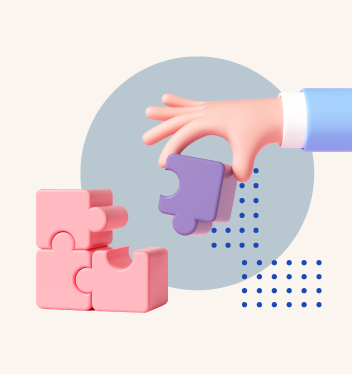Software engineering deals with the design, development, testing, and maintenance of software programmes. If you enjoy solving problem-solving and making digital products easier for users, consider shifting your career into one of the many open roles advertised in 2022.
Software engineers are in growing demand, and there are some essential skills you’ll need to learn if you want to become one. But how long does it take to qualify and find a job? Are online bootcamps worth it? Do you need a degree? We cover all your questions and more.
What Does a Software Engineer Do?
Every day we’re continually surrounded by software, from the fitness app on our iPhone notifying us to take more steps, to the design tool suggesting the best template to use when we design our work presentation. These solutions rely on someone to build the software, maintain the software, and continually innovate it in line with a user’s needs.
This is where software engineers play their part, using their computer science skills to build products or solutions that support the needs of the business. This could be a B2B company looking to help teams creatively collaborate or an e-commerce business wanting to improve their app user experience to sell more of a particular product.
On a day-to-day basis, a couple of software engineers’ responsibilities include:
- Working alongside various stakeholders to determine their software requirements
- Taking stakeholder requirements and translating business design into a logical design
- Designing, developing, testing, and maintaining software according to the users’ specifications
- Ensuring the system is maintained with all necessary updates and fixes
- Performing code reviews where required
- Supporting the testing team during testing phases of projects
A Software Engineer vs A Software Developer
The main difference between a software engineer and a software developer is the scope of work. Whilst a software engineer is often involved with software development, a software developer is rarely an engineer. A software engineer applies engineering principles that are methodically problem-solving, as their role is to be involved in every part of the product life cycle.
Whilst a software developer still needs to be proficient in coding, their role is to ensure the product is performing at its best in all areas and they are more focused on finding creative solutions to problems. A developer will often work directly with the client and graphic designers so that they can balance what the client is looking for with what the software can provide.
Qualification Options
To become a software engineer you’ll have to dedicate time to learn your craft! Unlike some other careers where you can learn on the job, software engineering requires an understanding of programming fundamentals.
Many universities offer software engineering courses which can take between 3-4 years to complete. There is also the option to study more intensively with software engineering bootcamps or intensives. By completing an online software engineering bootcamp, you can become a university-accredited, entry-level software engineer within six months: it’s simply a more intensive style of the learning program.
Benchmarking Salaries
Are software engineers paid well? Yes – software engineering can be a very lucrative career. But it is worth noting that the salary of a software engineer can vary depending on the type of role, company, geographical location, and level of seniority.
In the UK, the average starting salary for a software engineer is £31,000, and in the USA it is $41,000. A senior software engineer can make on average £80,000 a year in the UK, with the average salary of a senior software engineer in the USA being around $130,000.
Software Engineers Need Soft Skills
There are several soft skills required to be a successful software engineer beyond knowing how to write code. Most software engineers will have to interact across various departments, be part of a larger team or liaise with senior stakeholders on different projects. This people interaction means they need a range of soft skills to work well across teams. Skills include:
- Strong verbal and written communication skills
- Approachability
- Patience
- Collaboration and teamwork
- Excellent time management
- Ability to be flexible
- Empathy
Software Engineering Career Pathing
The career path of a software engineer may vary by company and individual but an average career path of a software engineer is:
- Software Engineer: 0 – 3 years’ experience
- Senior Software Engineer: 3 – 6 years’ experience
- Tech Lead: 6 – 9 years’ experience
- Engineering Manager / VP of Engineering: 9- 13 years’ experience
- Chief Technology Officer: 13+ years’ experience
How to Become a Software Engineer
1. Figure Out Your Long-Term Goals
Easier said than done!
The first step to becoming a software engineer is to identify your long-term goal. Do you want to work for an established company that has structured training programmes and fixed career opportunities? Does the idea of a fast-paced tech start-up excite you? Or would you like to be part of an agency, where you will probably work across different projects and have a varying client base?
While your long-term goal can and likely will change throughout your career, it is a good practice to consider what you are looking for when you start out, as this may guide the choices you make throughout your career path.
Above all, if you’re in the middle of a career switch, your transferable skills are incredibly valuable, so don’t discount them!
2. Identify If You Would Like to Be a Full Stack, Front End, or Back End Developer
Web development tends to break down into three components, the front end, back end, and full-stack development.
Front End Developer
A front end developer is responsible for everything you can see on a website. They will work closely with the web designer and client to build a solution that has an excellent user experience, essentially packaging up everything from the back end in a way that users can interact with. A front end developer will usually work with HTML, JavaScript, and CSS.
Back End Developer
A back end developer’s role is on the server side – they are responsible for preparing all the information for the front end developer, who will then take that information and make it appealing to the user. A back end developer is in control of how the website works. A back end developer will need to be proficient in programming languages such as Python, PHP, or Ruby, while also having a solid understanding of databases such as MySQL, Oracle, or MongoDB.
Full-Stack Developer
A full-stack developer is someone who can handle both front end and back end development – the full stack of technology that makes up a website. The benefit of a full-stack developer is their ability to get a project finished from start to end.
A full-stack developer will know how to use HTML (to add web content) and CSS (to personalize the web content), JavaScript (to make web pages interactive), and back end languages such as PHP, Python, and Ruby. A full-stack developer will also need to know how to design, understand and manipulate database queries.
Choosing a Software Engineering Certification
As you explore your options, you may consider a more formal degree or look for software engineering bootcamp style courses. Each style of learning brings its benefits, and one style may suit someone better than the other. A university degree in software engineering will usually last between 3-4 years and may have certain entry requirements.
This option may particularly suit someone who has just left school and is looking for a full university experience. Intensive software engineering online courses are an excellent option for those who may have completed a degree previously, are looking to change careers, or for someone who wants a shorter learning program across six months versus four years.
Many of the top universities offer software engineering or computer sciences degrees which are usually spread across 3-4 years of study. A software engineering online course is designed for those who want to learn coding skills quickly. They are more intensive in nature and whilst shorter can prepare the student to be as skilled as their university degree holding counterparts.
Find a Software Engineering Community
When you’re learning to become a software engineer it can be a great idea to find a community. Some of the best software engineering communities are:
- Women Who Code
- CodeNewbie
- Stack Overflow
- Learning to Code Facebook Group
- Self-Taught Programmers Facebook Group
- Hashnode
Top Five Books Recommended By Skills Union
- CSS3 for Web Designers by Dan Cederholm (2010)
- Git for Humans by David Demaree (2016)
- HTML 5 for Web Designers by Jeremy Keith & Rachel Andrew
- Responsive Web Design by Ethan Marcotte (2011)
- JavaScript for Web Designers by Mat Marquis
Other Recommended Reading
- Software Engineering at Google – Lessons Learnt Over Time by Titus Winters, Hyrum Wright, and Tom Manshre
- Get Coding! Learn HTML, CSS, and JavaScript and Build a Website, App, and Game by Young Rewired State
- Coding All–in–One For Dummies by Nikhil Abraham
- Cracking the Coding Interview: 189 Programming Questions and Solutions (Cracking the Interview & Career) by Gayle Laakmann McDowell
- Python Crash Course, 2nd Edition: A Hands-On, Project-Based Introduction To Programming by Eric Matthes
Best Software Engineering Podcasts
Best Software Engineering Blogs
Become A Software Engineer With Skills Union and NTU Asia
Get hands-on experience and build the confidence and skill set to become a software engineer. The SGUnited Skills Programme in Software Developer Immersive gives students hands-on experience on how to be an effective coder, build and test software products from scratch and collaborate with in-house engineering teams, jointly delivered by Nanyang Technological University (NTU) and Skills Union.







